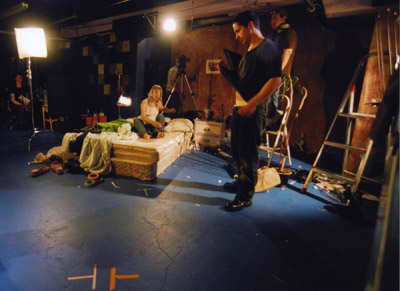

Making a movie is a very collaborative process, not least because, in the case of big action adventure movies, so much money is involved. The studios are only going to trust millions of dollars to a team of specialists who have proved that they can get it right before and that they will get it right again.
The most important people involved in making a film are the core creative team:
| Screenwriter(s) | The screenplay - and sometimes the original idea for the movie - starts here. Often a producer will have an idea and hire a screenwriter in order to turn it into a script. A lot of writers work in teams (usually two), and many different writers may work on a screenplay as it journeys towards production. |
| Director | The director is responsible for translating the script from the page to the screen. They control the overall look and style of what is being filmed, via their input on the performances of actors, positioning of the camera, use of locations, scope of special effects, pace of editing, and the final soundtrack. Producers tend to hire (and can therefore fire!) directors, and therefore have the final say. This is why directors also like to be producers on their movies, so they have equal status when it comes to creative decisions. Directors occasionally work with a partner, but this is relatively unusual |
| Producer | Movies don't happen without producers, who are involved at every stage from initial development and fundraising through to distribution. A producer (or a producing team) often takes huge financial risks to get a project off the ground, and is responsible for hiring and firing all other personnel. The buck stops with the producer. An Executive Producer is someone who helped get the film made (perhaps by supplying key funds, or bringing in a vital cast member) but did not have the hands-on involvement of a producer. The producer credit is a difficult one to get - see this news story. |
| Cinematographer/ Director of Photography | Every moment in a movie is carefully framed, lit and angled. The Cinematographer makes all the technical decisions that help fulfil the director's vision, and is often considered a major talent in their own right. He or she oversees the placement of lights and camera, and decides which lens, filters and aperture will be used on the camera. Some cinematographers double as camera operators, but you can often find them huddled by a monitor, looking at the image as it will appear onscreen, not how it looks through a lens. |
| Editor | The editor - usually with the help of a few assistants - is responsible for constructing the final narrative, selecting sequences from the available footage that best tell the story. Digital technology means that editors often start their process on the film set, immediately after action has been filmed, now they don't have to wait for reels of film to be developed. Although the director and producers will have a lot of input into the final cut, editors are trusted with a lot of important creative decision, and can be credited with "saving" a movie that didn't go so well on set. |
You can find more details of what these jobs entail at the following sites
Some people take on more than one of these roles - writing a script that they then go on to produce. direct and even sometimes edit. These multi-talented people are known as auteurs, because they can truly be said to be the single author of a film: at every stage of the process.

Although, ultimately, we associate the faces of actors with a movie, and often refer to a recent release as a "Shia LaBeouf movie", their performance is only a tiny part of the creative whole. Although some actors insist on script approval, and rewrite or improvise lines as they go along, they usually just turn up on set for the few weeks of principle photography and then go on to their next project. The above team will work on a film for much longer, often years. A star may get attached to a movie as part of the development and financing process. Stars mean audience interest, which means financing.
Actors are the only ones who appear in front of the camera. Actors with main roles are referred to as talent, and take instructions only from the director. Actors without lines are known as extras or background artists, and answer to the first assistant director, rather than the director.
Even a small-scale film production is very labour-intensive. The crew are hired for the duration of principle photography, and are overseen by a production manager. Depending on the scope of the shoot, roles might be fulfilled by one person or a department of dozens.
Research the role of the above main creative personnel in making a movie. Write a job description for each one, listing the following attributes
Then, using IMDb, find out more about three movie creatives who interest you, choosing from different areas (eg pick one director, one screenwriter and one cinematographer).